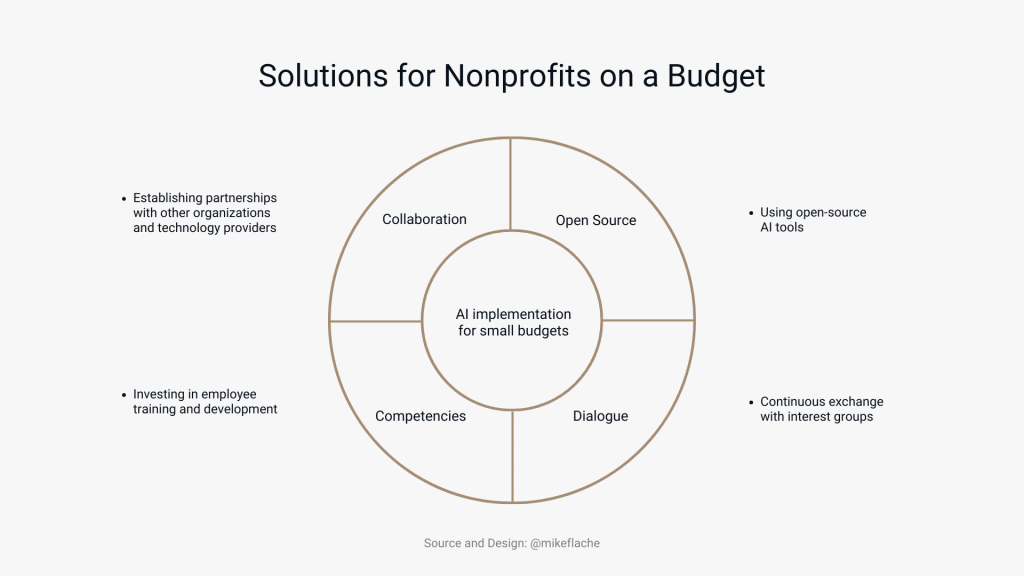The article was originally published on BBN Times.
When it comes to artificial intelligence (AI), we often talk about this technology in the context of business and commercially oriented organizations. However, AI also offers significant advantages for non-profit organizations, which I would like to discuss in more detail below.
One of the most important aspects, as in the commercial sector, is to use AI to gain relevant insights from large amounts of data and thus create a measurable basis for decision-making.
That allows non-profit organizations to optimize the efficiency of processes and fundraisers. Furthermore, potential sponsors and volunteers can not only be addressed in a more targeted manner but the effectiveness of various concepts and programs can also be improved.
In detail, this means:
- Through analysis, AI recognizes patterns in the existing data that are difficult for humans to identify. From this, organizations can derive optimization potential to better understand the needs of their beneficiaries and increase the positive impact of their programs.
- By automating routine tasks such as data entry and analysis, organizations can give their employees more time for strategic tasks. That reduces administrative effort and improves the efficiency of internal processes.
- AI can also be used to predict future trends and outcomes based on historical data. Non-profit organizations can use this information to anticipate challenges and opportunities and make informed decisions.
However, it makes sense if we do not see AI as a “magic bullet.” Non-profit organizations continue to put people first. Working closely with beneficiaries is important to ensure programs meet their needs.
Therefore, AI is a means to an end to support analysis, planning, and decision-making — not a substitute for human judgment and empathy.
The challenges nonprofits face when implementing AI
To implement artificial intelligence, nonprofits face a number of challenges.
A major challenge is the cost of developing and implementing AI technology. Non-profit organizations often have limited budgets, which means they may not have the resources to invest in AI technology or hire people with the skills needed to implement it.
Another challenge is the potentially low awareness and understanding of AI among directors and employees. It has been my repeated experience that nonprofits are not fully aware of the potential benefits of AI or how to apply them to their specific missions and programs. There are also concerns about the ethical implications of using AI, such as privacy and bias.
Finally, there is a shortage of AI talent in the non-profit sector. While there are many talented data scientists and AI experts in the private sector, few currently work in the non-profit sector. That means nonprofits face the challenge of finding and hiring the right people to lead their AI initiatives.
Despite these various factors, there are solutions that nonprofits in particular on a budget can consider to successfully deploy AI. Examples include partnering with other organizations and technology providers, leveraging open-source AI tools, investing in staff training and development, and participating in ongoing dialogue with stakeholders.

I think it’s important that non-profit organizations not only look at AI from the point of view of efficiency and cost reduction but, above all, to improve the positive impact of their programs.
The prerequisite for this is that the organizations can measure the effect of their programs to continuously optimize them on the one hand and to win new supporters on the other.
How nonprofits can use AI to demonstrate the impact of their programs
Another benefit of artificial intelligence for nonprofits is the ability to improve transparency and accountability. By using AI tools to analyze data and track performance metrics, organizations can more easily demonstrate the impact of their programs and share that information with stakeholders.
One way is to use machine learning algorithms to analyze large amounts of data and identify patterns that are difficult to detect manually. Organizations can use these insights to track the effectiveness of their programs, identify opportunities for improvement, and make data-driven decisions about how best to allocate their resources.
Another option is to use natural language processing (NLP) to analyze unstructured data, such as social media posts, emails, and other text-based communications. By analyzing this data, non-profit organizations can gain valuable insights into how their programs are perceived by the public and identify potential areas for improvement.
Final thought
Overall, AI is proving to be a valuable technology for nonprofits. While implementation presents some challenges, the benefits associated with it outweigh the disadvantages.
The responsible decision-makers in the organizations would do well to approach the use of AI strategically and plan this initiative comprehensively. That also includes considering the ethical consequences of using AI.
Based on automated data collection, analysis, and reporting, organizations can focus on delivering quality programs. For me, the latter is the main argument for making a real difference in the lives of the people that nonprofits serve.

